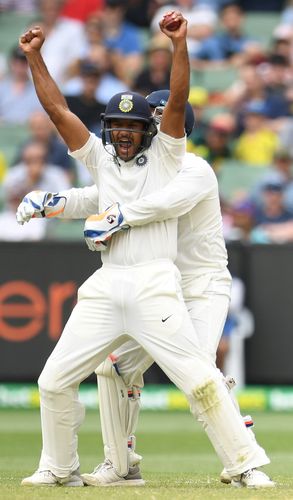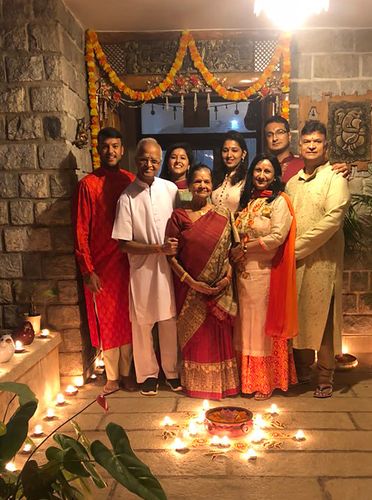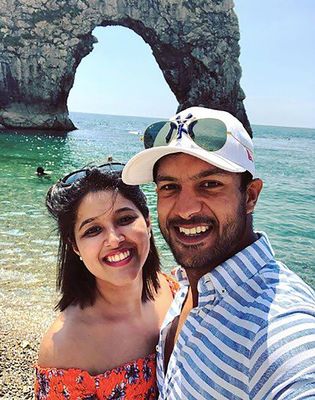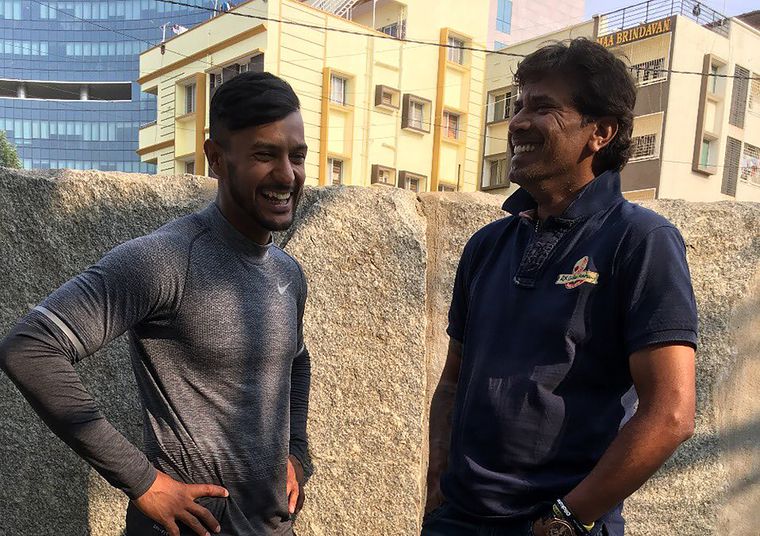It was a moment he had waited for long. And, when it came, Mayank Agrawal seized it. The 295th man to represent India in Test cricket, he walked out in front of a packed crowd at the Melbourne Cricket Ground on Boxing Day and scored an impressive half century.
It was a precious moment for the 27-year-old Bengaluru lad, who had been on the selectors’ radar for long but had failed to break into the national team. When the Test call finally came for the third match of India’s Australian tour, it was the fruition of years of hard work and the end of a harrowing period of self doubt. His fans cheered, coaches sighed in relief, and critics were stunned, as Mayank’s poise delivered not just runs but also a promise. He garnered 76 runs before being dismissed by Pat Cummins.
Mayank is a man for all formats, says Karnataka coach J. Arun Kumar, who is “Jack sir” to Mayank. He is hard work, perseverance and passion personified, says RX Murali (R. Muralidhar, who runs the RX Cricket Academy in Bengaluru), his personal coach. For the past five years, Murali has steadied Mayank through all his anxieties, and helped him restore his equilibrium.
Mayank’s wife, Aashita Sood’s, Instagram post, which came immediately after his feat, perhaps, best sums up his perseverance: “26th December 2018, this date and this number #295 will always be etched in our minds and will be unforgettable. I’m so so happy and proud. You’ve worked so hard, tirelessly, pushing yourself day after day for this moment. And it’s finally here and how! You’ve put in the long hours, hard work and sweated blood to reach here today and you did it in style. You broke down every barrier, obstacle and the proverbial door that was in your way. Congratulations, my love @mayankagarawal, on a fantastic debut at MCG and to many many more and wonderful innings.”
It has not been an easy ride for Mayank. Five years ago, when he came under Murali’s care, he was insecure, following a dip in his performance. “It was easy to guide him, as he was passionate and had clarity,” said Murali. “He would leave home around 6am, drive 35km to the gym, then play with the Ranji trophy teammates, have lunch at the KSCA club and drive 22km to my academy. He would do drills for two and a half hours before driving back home. All this he did for one reason—play for India.”
Murali started with improving his technique. “The first three years were tough,” said Murali. “I had many heartbreaking moments as I saw somebody so hardworking and honest not getting the desired outcome.”
When Arun started working with Mayank at the Ranji nets, a lot of people, including some selectors, felt it was a bad move, saying he was a one-day batsman. “I always took chances,” said Arun. “I have chosen many people instinctively as I felt they can do good for the Karnataka team, and Mayank is one such player. I took him in when he was playing for the under-23 side. We were looking for an opener who would set the tone. Till then, our openers were quiet, and it gave a feeling that the bowling side was better. So, I wanted somebody who would attack and Mayank was the right one. The guys who went in after him benefitted psychologically as Mayank made them feel that the bowling was not tough.”
Though Mayank came to Murali much later, the coach had already noticed him when he was playing for Bishop Cotton Boys’ School. “He was 14 or 15, and stood out for his ability to strike. Everybody noticed him. I remember a visiting Australian academy playing with Under-16 cricketers in Karnataka. He scored 300-plus runs in three matches in the five-match series. They were big 100s. In the fourth match, the cricket association asked me to rest him as they wanted to look at others play, too,” said the coach.
Mayank played for the India U-19 team in 2010 and, a year later, made his IPL debut for Royal Challengers Bangalore. He later played for Delhi Daredevils and Rising Pune Supergiant, and currently is with Kings XI Punjab.
His poor performance in the last season of the IPL was forgotten when he scored loads of runs for India A in England, New Zealand, and Australia. In September 2018, he was selected to the Test squad for the West Indies tours, but did not play.
Though Mayank has an attractive game, his rise has not been as quick as that of many of his peers. “When he played India U-19, he was the highest run-scorer. Normally, somebody who performs so well in Ranji Trophy straightaway comes back. But it did not happen with Mayank, perhaps because Karnataka has a lot of talent,” said Murali.
Mayank got stuck at the Under-22 and Under-23 levels for too long. And suddenly there were many questions being raised. “He started doubting his ability,” said Murali. “Then he did very well. When he was benched, he felt he was not moving forward because something was lacking in him. It took him three years to bounce back. People believed in him. In his first Ranji, it was a brilliant 91 runs; then, his performance plummeted. There was no consistency, because he did not believe in himself. When he came to me, he wanted to work on his technique.”
Once the technique was sorted, fitness was under focus. Mayank turned to long-distance running and Vipassana meditation. “We created a lot of awareness. It is like playing rummy. First you need to know what is in your hand, and then focus on what is on the table,” said Murali.
Vipassana, the Buddhist method of meditation, came to Mayank’s aid. His father, a stickler for discipline and hard work, had also taken refuge in meditation when their herbal healthcare company was transforming from a family-run business to a professionally-managed company 20 years ago. Former Indian skipper Rahul Dravid also advised Mayank to control his “mental energy”.
“Mayank needed to understand his game, dig deeper and evolve a pattern of play,” said Murali. “But you cannot stop there, and should be able to execute it on the field. You have to be aware that the ball is swinging or your hand is moving very fast. Self-awareness is achieved through mental training. We also identified different triggers. While some thoughts create anxiety, fear and uncertainty, some bring calmness and happiness. As a coach I have no answers. He finds the answers himself and becomes his own coach.”
Mayank replacing K.L. Rahul triggered a Twitter war between the fans. But the two share great camaraderie. Rahul took to Twitter to hail the moment: “Seeing my best friend getting his cap and debuting for the country makes me so happy and proud today. Upwards and onwards my brother, you’re just getting started Monkus.”
The duo would ask the coaches to help them play like the other. “When it comes to technique, Rahul has been a class apart,” said Arun. “Mayank enjoys everything he does on field. He loves to bat. He loves to field. He chitchats on the field and keeps other players energised. Mayank’s banter on the field keeps his teammates involved. He is loved for being a team man.” The easygoing guy, however, is a private person, and he chooses his friends wisely.
The Agarwals are a joint family—Mayank’s grandparents, parents Savita and Anurag, elder brother Ayush and his wife Prerna, and the latest addition to the family, Mayank’s wife Aashita. A lawyer, Aashita is the daughter of Praveen Sood, former Bengaluru police commissioner.
Mayank proposed to her, his girlfriend of eight years, atop the London Eye a year ago. She was studying intellectual property law at Queen Mary University in London. They got engaged in January 2018, and married in June.
Mayank’s grandfather, R.K. Agarwal, who is a pioneer in the healthcare industry, is his biggest inspiration. Agarwal’s father started the company in the 1950s, and he instituted an R&D facility in Bengaluru in 1970. In 1998, the company was named Natural Remedies, and Mayank’s father became the CEO. Natural Remedies is now a $35-million company with operations in many countries.
When Mayank told his father he wanted to play cricket, he was supportive, but told him that if he wanted to be in the family business, he could not come and occupy the MD’s seat. “You have to start as a clerk and work yourself up as there are other people who have been working here for 15-20 years. You cannot overtake them just because you are my son,” he told him.
As soon as Mayank scored his maiden Test half-century, social media was abuzz with comments about his age and comparisons with Shikhar Dhawan, who, too, debuted at 27. Historian Ramachandra Guha tweeted: “Like Shikhar Dhawan, Mayank Agarwal made his Test debut against Australia at the mature age of 27, with much experience at the first class level.
Mayank’s first Test innings may not have the dash of Dhawan’s, but it has been equally impressive, given the state of the series.”
Mayank’s age has been looked at with apprehension for a while, with many even doubting his ability to play multiple formats. He was 25 when he started being consistent, but was not a regular in the state team. “Unlike most people who lose hope, he believed he could play for India,” said Murali. “That is his biggest strength. He is definitely ready for a long haul, and I have a feeling he will get to play all formats. It is only a matter of time.”
Mayank seems to have rekindled the hopes of many players who do not have age on their side. “Frankly, Mayank is the fittest guy,” said Arun. “Moreover, for Test cricket you need a certain level of maturity and you are only taking a chance by choosing 18-19 year-olds. You cannot beat experience. Earlier, the players from England and Australia used to make their debut at 30. Mayank’s long experience will be an asset.”





